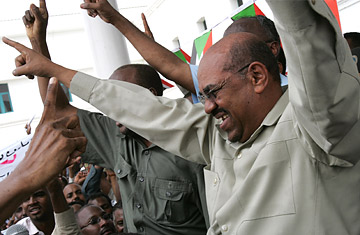
Sudanese President Omar Hassan al-Bashir waves as hundreds of supporters gather to protest his indictment on war-crimes charges in Khartoum on July 13
The indictment of Sudanese President Omar Hassan al-Bashir on charges of genocide, crimes against humanity and war crimes over the slaughter in Darfur is a step as bold and historic as it is fraught with practical and political peril.
The charges were announced Monday by prosecutors from the International Criminal Court (ICC), set up six years ago under U.N. auspices to pursue war criminals and those responsible for genocide. Established in the wake of the horrific bloodshed in Rwanda, Liberia, the Democratic Republic of Congo, Sierra Leone and the Balkans in the last decade of the 20th century, the court was designed to answer the need for the international community to take a more active role in preventing massacres and holding the perpetrators to account. The problem, of course, has always been that pursuing justice against bad guys who still hold power can impede or even imperil the pursuit of peace — as it may do in the case of Darfur.
When news first leaked last week of the ICC prosecutors' case against al-Bashir, the government in Khartoum reacted angrily. Khartoum does not recognize the ICC and says that any case against al-Bashir — who seized power in a military coup in 1989 and has ruled Africa's biggest country ever since — or any other Sudanese citizen will jeopardize ongoing peace talks over Darfur. The indictment may hamper efforts to expand a peacekeeping mission in the region, and African Union peacekeepers fear they may come under attack from Sudanese soldiers and militias loyal to the government. Observers are also concerned that the indictment could embolden the rebel militias who have rejected the peace process. And aid workers worry that they could be kicked out of the country altogether, leaving the millions of people forced to live in displacement camps unfed and exposed to more violence.
Some critics even argue that the international community's post-conflict pursuit of war-crimes charges against figures such as former Liberian warlord Charles Taylor (who is being tried by a Special Court for Sierra Leone) has prolonged suffering in places like Zimbabwe, where leaders face a similar fate if they surrender power. Taylor was persuaded to accept exile in Nigeria in 2003, a move that helped end Liberia's bloody civil war. Three years later, however, he was arrested and put on trial. Taylor's experience may be the reason that Mugabe and his generals appear to have rejected any deal involving exile. "The Old Man is staying," a senior member of Mugabe's Zanu-PF party told Canada's newspaper Globe and Mail last month, "because I'm not ending up in the Hague."
The ICC is a legal body with no connection to any political or diplomatic authority — its focus is necessarily limited to laws and evidence. And based on the testimony and evidence gathered in Darfur, ICC chief prosecutor Luis Moreno-Ocampo said this week that "al-Bashir masterminded and implemented a plan to destroy in substantial part the Fur, Masalit and Zaghawa groups. ... His alibi was a 'counterinsurgency.' His intent was genocide."
Moves to hold al-Bashir accountable before the conflict has ended, however, will clearly complicate the situation on the ground. The International Crisis Group, a respected mediation group led by retired diplomats from dozens of countries, argued in a paper in March that the international community should "acknowledge the tensions between peace and justice and to recognize that pragmatism and recent history indicate that justice cannot always claim primacy." As former U.S. special envoy for Sudan Andrew Natsios wrote recently, prosecuting al-Bashir now "may well shut off the last remaining hope for a peaceful settlement for the country." Avoiding justice altogether creates a sense of impunity among those, like Mugabe and his security men, who unleash violence against civilians. But to avoid even more bloodshed, argue the pragmatists, justice may be best deferred — at least until the guns go silent.
